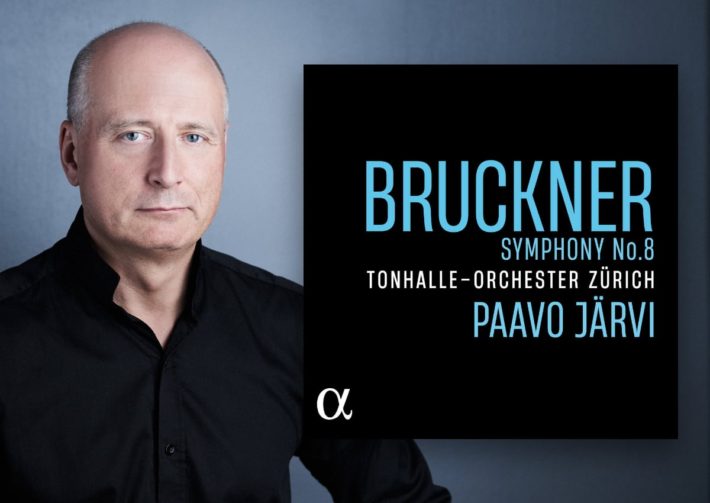Image: ©️ Kaupo-Kikkas
The ever-prolific Paavo Järvi returns to Bruckner with his Tonhalle-Orchester Zürich. Earlier this year the same team released a recording of the seventh, and Järvi has also recorded a complete Bruckner cycle with the Frankfurt Radio Symphony Orchestra. That series was exceedingly difficult to collect for those of us in America, but streaming has solved the issue, allowing comparisons between his two recordings. The Frankfurt performance was recorded in February 2012, and this latest one in September 2022, leaving one to wonder if there was a significant interpretive change in those ten years.
One change is tempo: every movement is now slower, adding an additional 5 minutes onto the total playing time. The Tonhalle-Orchester is an exceptionally fine group, though no one will mistake their sound for the splendid Bruckner orchestras in Amsterdam, Berlin, and Vienna. Even comparing Järvi’s two recordings, the Frankfurt orchestra offers greater weight and tonal splendor than their Zürich colleagues. Yet the Tonhalle’s sound should not be discounted; indeed, its sweetly lyrical string playing, and characterful winds would be a key ingredient for success in a differently conceived interpretation.
We can always assume that Paavo’s recordings will offer technical polish, balanced textures, and plenty of light and shade – that is certainly the case here. But in Frankfurt, Järvi is direct and unfussy, trusting that the music can speak for itself. But now he adopts a more willful interpretive profile, leading to several exaggerations that on repeated listening become increasingly unconvincing. In the first movement (beginning 5’20”) he pulls the tempo back, creating a stasis that one might mistakenly believe is an outtake from Mahler’s sixth symphony. Perhaps Järvi is making a connection between the two composers, but Mahler builds those jarring tempo and textural changes into his music, whereas Bruckner does not. Consequently, the moment is wayward, one loses the pulse, and the structure is compromised. Minutes later (8’48”) he manhandles the brass lines as they approach their climax (in Frankfurt the same passage is far more subtly managed). Instead of rolling inexorably into its climax, the music is impeded from its intended destination. And while the final climax (14’16”) has threatening ferocity, the trumpet fanfares that immediately follow seem like an afterthought, undermining the emotional weight of the entire passage (Karajan somehow makes the fanfare even more terrifying, especially in his final Vienna recording on DG).
Related Classical Music Reviews
- Review: Bruckner – Symphonies Nos. 1 & 5 – Nelsons, Gewandhausorchester
- Review: Bruckner – Symphony No. 2 – Vienna Philharmonic, Thielemann
- Review: Franz Schmidt – Complete Symphonies – Frankfurt Radio Symphony Orchestra, Paavo Järvi
- Review: Tchaikovsky – Symphony No. 6 – Tonhalle Orchestra Zürich, Paavo Järvi
In the Scherzo, the difference between Frankfurt (13’17”) and Zurich (13’33”) is minimal, though the Frankfurt performance seems more in control, whereas in Zurich it occasionally feels like the playing could derail – or perhaps they are more successful in creating a rambunctious atmosphere. Those who claim Bruckner never wrote a true Allegro might particularly enjoy this reading. The interpretation is leonine and athletic, far removed from the rustic Ländler Karajan, Wand, and Guilini evoke.
The Adagio is expertly played but has little of the magic and profundity found in readings by Furtwängler, Jochum, Böhm (in a recording with the Zurich Tonhalle), Tennstedt (a hard-to find recording of a live Boston Symphony performance), Barenboim (Berlin PO), and the three mentioned above. Järvi achieves a lyrical flow at his slower tempo (roughly a minute and half longer than in Frankfurt), but strings never dig into the accents, and I miss the sheer tonal weight one takes for granted from German orchestras. The build up to the movement’s central climax (16’08”) begins with radiant string playing, but there is an unwelcome tempo shift at 17’24” that resets to a slightly slower pace, negating the sense of inexorable momentum the performers just created. And here, and throughout the recording, the timpani are far too recessed.
Järvi’s Finale is over two and a half minutes slower in Zurich, with more willful gear shifts that disrupt our sense of structural cohesiveness. The playing has superficial excitement, but barely hints at the shattering emotional catharsis heard in Blomstedt, Karajan and Giulini.
The liner notes mostly focus on the legacy of Bruckner performances by the Tonhalle’s past and present music directors, instead of offering information about the composer and his music. Over the last few years, I have reviewed several Bruckner releases in the Nelsons/Gewandhaus and Thielemann/Vienna cycles, often arguing that, despite superb playing, the readings are superficial when compared to older interpretations. Perhaps I am out of touch with modern Bruckner interpretation, and this new reading will please you more than it did me – but I cannot say that this new release would displace several other primary recommendations.

Bruckner – Symphony No. 8
Tonhalle-Orchester Zürich
Paavo Järvi – Conductor
Alpha, CD 987
Recommended Comparisons
Karajan & Vienna | Wand & NDR | Solti | Böhm & Tonhalle
Included with an Apple Music subscription:
Latest Classical Music Posts
- Review: Bach – Goldberg Variations – Yunchan Lim, Piano
- Review: Elgar – The Dream of Gerontius – Huddersfield Choral Society, Orchestra of Opera North, Martyn Brabbins
- Notable Classical Music Box Sets, February 2026
- Review: Giorgi Gigashvili Plays Prokofiev – ‘With All My Breath and All My Blood’
- Review: Mahler – Das Lied von der Erde – Lemieux, Staples, Les Siècles, Roth
- Review: MacDowell – Orchestral Works, Vol. 2 – Xiayin Wang, Peter Dixon, BBC Philharmonic, John Wilson
Read more classical music reviews or visit The Classic Review Amazon store
Follow Us and Comment:
[social_icons_group id=”964″]
[wd_hustle id=”HustlePostEmbed” type=”embedded”]

















